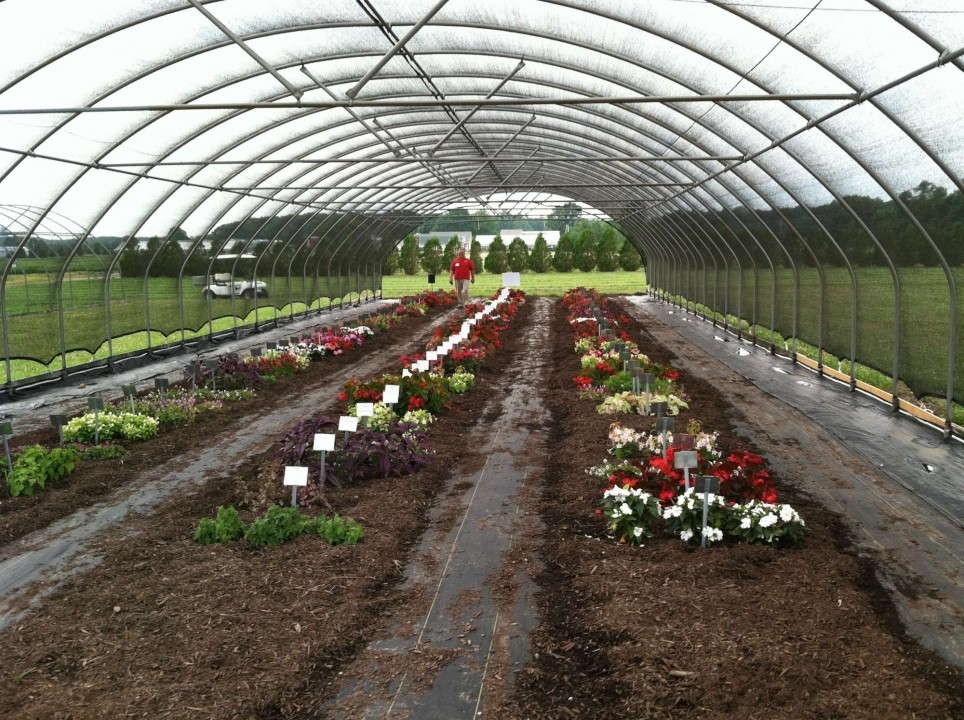Greenhouse Retrofits And New Builds: Planning Tips
Here are some tips to help you with planning an expansion, reducing operating costs, or improving efficiency.
The first step is to know what you want to accomplish. If operation labor reduction is the key motivator behind a retrofit project, then you need to look at how the greenhouse is affecting your labor. The best value for retrofitting will be different than if increasing crop yield is your main goal.
Greenhouse Retrofits For Increasing Worker Productivity
• Replace stationary benches with rolling benches. In an effort to pack as much production as possible inside the greenhouse, many greenhouse growers leave virtually no space to walk between the crop. With rolling benches, you only need one aisle per house, so you may increase the width of your production aisles without losing any crop production. This enables workers to move more efficiently between the benches.
Typically, rolling benches can also offer the benefit of adding 25 percent more production space from conventional stationary bench layouts.
• Bring in material handling systems like double rail carts and Echo Basket Systems. Remember, if your material handling system is supported by the greenhouse, you need to make sure the greenhouse design will handle these loads.
• Consider adding more ventilation, or HAF fans to move the air. If your greenhouse gets too hot in the summer, it’s not just your plants that may be lagging. Creating a good working environment will lead to more productive workers.
Greenhouse Retrofits For Increasing Production
• Rolling benches get another vote under this category. Rolling benches can typically add 25 percent more production space from conventional stationary bench layouts.
• Reglaze the roof. If you are growing in a poly greenhouse, reglazing is part of your regular maintenance schedule. But 8mm PCSS roofs, acrylic and even glass can get dull or damaged. When looking at how to get more out of your greenhouse, consider the light levels you need and review your roof glazing.
Greenhouse Retrofits For Improving The Crop Environment
• Add extra ventilation. This can be the easiest and most cost-effective retrofit to an older greenhouse. Rollup curtains can be added to any hoop house or gutter-connected poly sidewalls or poly end walls, and can be manually operated or hooked up with a simple motor. Hard glazed sides and ends can be fitted with vents, and in most cases you can reuse the existing sidewall glazing. And gutter and ridge vents can be added to most greenhouse arches with a little expertise. What is that value in adding ventilation? Better flexibility for your growing environment to reduce humidity, increase air flow and help harden plants.
• Raise the roof. This is not a retrofit project for the squeamish, and in some cases it may be more expensive than tearing down the greenhouse and starting from scratch. However, every year a few growers decide it is worth it to improve the growing environment. For this kind of project, you need to make sure you hire a qualified greenhouse builder with experience in raising greenhouses. Keep in mind that modern commercial greenhouses are being built with 16 to 24 feet under-gutter heights.
Greenhouse Retrofits For Reducing Other Operating Costs
• Install energy curtains. Energy curtains will result in significant heat savings in the winter – between 20 and 40 percent. They also provide shade and help keep your greenhouse cool in the summer months.
• Check your vents. Over time with sun exposure, wind, rain and snow, the rubber seal on ventilation windows can grow brittle, or malformed. This means that your vents will no longer seal properly. Improper seals cost money as heat is directed out of your greenhouse. Poorly sealed vents also affect the operation of your vent. Modern greenhouse roof ventilation uses EPDM rubber, which is more durable than older vent rubbers.
• Consider flood benches. The savings potential in water and fertilizer can often justify the cost of the benches.
New Commercial Greenhouse Construction
When retrofitting your greenhouse is not the answer, a new construction expansion may be what you need. Planning a construction project from the ground up involves a lot of details that you may not deal with on a regular basis. Use your greenhouse manufacturer and greenhouse construction company to help you with the planning process. Here are a few pointers to help you start:
• Assess your production demand to establish the greenhouse footprint. Consider beyond your immediate needs and plan to allow for some future growth as well, if possible.
• Now consider the environment you need for optimum plant growth. Talk to your supplier about how extra under-gutter height, additional ventilation, glazing material options and the different styles of greenhouses can improve or detract from the environment you want.
• Look at your existing facilities and systems. What is sufficient for this expansion and what will require more capacity? This includes shipping bays, warehouse space, office space, environmental controls and the heating system. You should always get a qualified greenhouse heating engineer to review your current greenhouse heating and your expansion plans.
• Talk to your local building inspector. Every year, more regulations are put in place. Make sure your proposed expansion follows all laws and town regulations. For instance, if your building is too close to your neighbor’s land, you may need to file a variance with the town.
• If you are expanding your production space, you may need more warehousing and storage space to accommodate this extra yield. Most greenhouse growers wantto build these areas out of greenhouse structures. Widespan greenhouses are particularly good for shipping areas.









